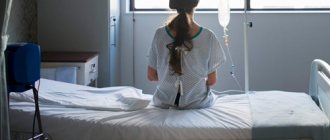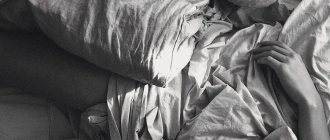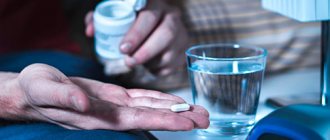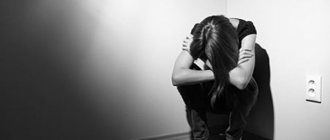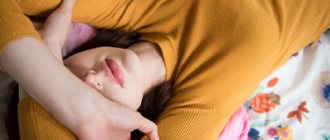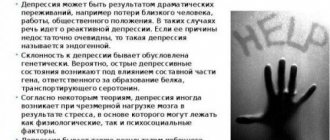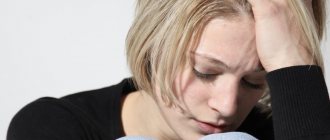Larval depression (also called camouflaged or masked) is a special type of affective disorder in which somatic symptoms come to the fore, while the signs of depression itself either do not appear at all or are expressed only to a minor extent. The main problem is that a person is unaware of the true reason for his poor health. He turns to therapists, specialized doctors, who are also extremely rarely able to make a correct diagnosis; as a result, the patient receives the wrong treatment for months, and his condition only worsens. Sooner or later, against the background of masked depression, quite real psychosomatic diseases develop. Specialists at the Leto mental health center very often encounter this kind of disorder. We always practice an individual approach, so a positive result can be achieved in the vast majority of cases.
Main causes of masked depression
The etiology of depressive spectrum disorders is associated primarily with hereditary predisposition. Indeed, genetically determined defects in metabolism and serotonin synthesis play a fairly large role in the development and progression of the clinical picture of such a disorder.
But in addition to heredity, the following are of great importance:
- characteristics of a person’s character and personality: as practice shows, people with a hypertrophied sense of responsibility and accustomed to hiding their emotions are predisposed to masked depression;
- principles of education at an early age: excessive demands, comparison with other children (not in favor of the child), punishment for unwillingness to unquestioningly obey the will of the parents, etc.;
- chronic stress, fatigue, nervous tension;
- long-term exhausting physical and emotional stress;
- illness or loss of loved ones;
- accident and other traumatic situations.
Psychotherapy for depression
Advertising:
Psychotherapy is an integral part of the treatment of depression. Depending on the form and severity of the disorder, psychotherapeutic methods can be used alone or in combination with drug therapy. There are a large number of psychotherapy methods. The optimal technique is selected individually for each patient, depending on the reasons that caused depression. The choice of psychotherapeutic method is also influenced by factors such as the severity of symptoms, the general condition of the patient and the presence of other diseases.
Video - 11 habits of people with hidden depression
Clinical picture and forms of masked depression
There are several variants of such disorders (they are often called “masks”):
- in the form of vegetative, somatization and endocrine disorders;
- in the form of pain syndrome (algia);
- with alienation of somatosensory drives;
- in the form of psychopathological disorders;
- in the form of pathocharacterological disorders.
More often than others, larval depressions occur, accompanied by somatovegetative, dermatological and pain symptoms. They appear:
- dizziness;
- hot flashes (mainly to the face, neck and chest), which may be followed by severe chills;
- excessive sweating;
- shortness of breath, feeling of lack of oxygen;
- changes in eating behavior: lack of appetite, pronounced aversion to food followed by loss of body weight or vice versa, overeating and weight gain;
- skin itching, focal hyperemia, peeling of the skin, possible secondary fungal or bacterial infection;
- menstrual disorders, decreased libido, impotence.
Approximately 2/3 of patients with this disease complain of pain of varying intensity and nature. They differ from algia in somatic diseases in the following ways:
- lack of clear localization; moreover, unpleasant sensations can “migrate” from one part of the body to another;
- the pain does not increase with palpation;
- discomfort appears and disappears spontaneously, for no apparent reason, they are not associated with food intake, any stressful situation, etc.;
The pain is usually not acute; the patient describes it as painful and excruciating. However, a clear circadian rhythm is typical: discomfort increases in the predawn and morning hours, weakens during the day and usually disappears in the evening.
Often masked depression is accompanied by symptoms reminiscent of a panic attack (pseudo-asthmatic variant of the disorder). The attack is characterized by a spontaneous onset, usually in the morning. Breathing becomes shallow, rapid, and shortness of breath occurs. The patient experiences a painful feeling of suffocation, tightness and a coma in the chest. This condition is often accompanied by fear and psychomotor agitation.
Another symptom of masked depression is thermoneurosis - an unreasonable increase in temperature.
Severe symptoms of subclinical depression
It can be difficult to distinguish subclinical depression of an intolerable nature. But close people are able to notice changes in behavior, because before the person was not like that. This should suggest a possible illness. It is worth taking a closer look at other manifestations to be sure that the problem is not in the person himself, but in his condition at the moment.
Symptoms of dysthymia:
- melancholy and boredom;
- fatigue, drowsiness, fatigue;
- conflict, irritability;
- egocentrism;
- emotional instability;
- increased anxiety, fears;
- unreasonable feelings of guilt;
- lethargy, slowness;
- indifference to any activity and one’s life;
- lack of emotions, feelings of intimacy and empathy;
- hypochondria – searching for non-existent diseases, craving for medical examinations;
- hysteria - a tendency to dramatize events;
- unpleasant and unusual bodily sensations without an objective reason for their occurrence.
Among the symptoms, one most often clearly predominates, the rest are insignificantly expressed. This is a characteristic feature of dysthymia. If subdepression has formed against the background of the death of a loved one, an overvalued complex of “cult of the deceased” may arise. The patient constantly talks about him, goes to the cemetery, and reviews things related to him. Sometimes, against the background of dysthymia, phobias develop: cacero-, cardio- and nosophobia. This is due to unusual bodily sensations, the cause of which is not damage to internal organs, but mental processes.
Symptoms characteristic of depressive affect
Although with masked depression, disorders of the psychoemotional sphere are expressed to a minor extent, pay attention to:
- feelings of suffering, heartache, depression, despondency, hopelessness and despair;
- groundless excitement, vague forebodings, pessimism;
- difficulty concentrating, slow reactions and movements;
- mood swings during the day;
- constant thoughts about one’s own worthlessness, uselessness, depravity, lack of prospects, inability to provide for a family, raise children properly, etc.;
- growing anxiety (up to the formation of phobias) about the state of one’s own health.
It is also possible to develop so-called “moral anesthesia” with the loss of the ability to experience both positive and negative emotions, to experience love, hatred, compassion, etc. Against this background, obsessive thoughts of suicide may appear.
Depression and how to deal with it
- home
- For patients
- Articles
- Depression and how to deal with it
»
»
»
What is depression and how to deal with it.
Depression is a mental disorder that leads to a depressed state and can persist for a long time. It can be one-time, repeated after a certain period of time, or permanent. The last option is the most dangerous; it can lead to serious mental disorders.
According to doctors, by 2021 the number of people with this diagnosis will exceed the number of cancer and cardiovascular patients.
Depression is already the cause of 60% of suicides.
Not so long ago, the peak of depression was between the ages of 30 and 40; today it has become sharply “younger” and affects people under 25 years of age.
People of any age are susceptible to depression, including preschool children. There are slightly more patients among older people. The risk of developing depression among single and divorced people is 2–4 times higher than among married people. At the same time, divorced and single men are at greater risk than divorced and single women.
Women develop depression twice as often as men. However, representatives of the stronger sex are much less likely than women to seek help from specialists, preferring to suppress symptoms with alcohol or throw themselves into work.
Apathy and bad mood can occur in completely healthy people. Depressive states are accompanied by motor and mental retardation, anxiety, the cause of which cannot be determined, and insomnia. At the same time, it is difficult for a person to concentrate and make decisions. A bad mood usually goes away within a day or two, but depression can last for months.
True, a state of depression, if it is caused by grief, the loss of a loved one, can also last a long time. But everyday life with its worries and worries about daily bread gradually smooths out the pain of loss.
Causes of depression
The disease can develop under the influence of internal and external factors. Reactive depression occurs as a consequence of a person’s internal experiences caused by serious stress, for example, the death of a loved one, loss of material values, divorce, etc. In these circumstances, a person is oppressed by a feeling of loss and a feeling of complete helplessness. Sometimes depression is a companion to atherosclerosis and hypertension. This condition can also occur in severe inflammatory diseases such as gangrene, when the body is intoxicated with tissue decay products.
Endogenous depression develops with complete external well-being - it is caused by mental illnesses, mainly hereditary, which lead to metabolic disorders.
Internal causes of depression:
- hormonal imbalances, in particular, decreased production of neurotransmitters, primarily serotonin, disruptions in the synthesis of norepinephrine, dopamine;
- hormonal changes in the body during certain periods of life (after childbirth, menopause, puberty);
- systematic use of medications, one of the side effects of which is depression;
- diseases of the nervous and endocrine systems (neurasthenia, hypothyroidism);
- deficiency of vitamins and minerals, especially affecting the nervous system; lack of B vitamins;
- dehydration of the body;
- anemia;
- infectious diseases;
- chronic pathologies;
- lack of sunlight (seasonal depression);
- lack of sufficient oxygen supply;
- alcoholism;
- addiction;
- abuse of sedative and hypnotic drugs.
Symptoms of depression
. To be diagnosed with depression, the following symptoms must be present for at least two weeks:
- loss of interest in the environment and life guidelines;
- constantly low emotional background, pessimism, complete concentration of thoughts on negative events and sensations;
- loss of performance;
- weakness;
- insomnia;
- increased irritability;
- low self-esteem, attacks of self-flagellation;
- loss of appetite;
- weight loss or, conversely, uncontrolled weight gain;
- unmotivated fear and panic attacks;
- decreased cognitive function of the brain (inability to concentrate);
- lethargy;
- excessive fatigue and loss of strength.
Patients suffering from depression are often bothered by headaches, dizziness, discomfort in the heart and abdomen, joint pain, constipation alternating with diarrhea, menstrual irregularities in women, loss of sexual desire, etc. Depression imitates and “mimics” any somatic (bodily) diseases. It is for this reason that doctors have coined the term “masked depression” - for cases when it is “hidden” under the guise of a somatic disorder. If depression occurs, it is very important to treat it like an illness. For example, in hypertension, the mechanism that regulates blood pressure is disrupted, and in depression, the mechanism that regulates mood is disrupted. We do not hesitate to consult a doctor about hypertension, and we should not delay a visit to him for depression.
Depending on the results of the examination, the doctor may prescribe antidepressants - drugs that improve mood, or tranquilizers - drugs that neutralize the effects of adverse external factors on the psyche. In a state of depression, the reaction to any negative situation becomes extremely aggravated and the slightest offense can drive a person crazy. With the help of tranquilizers, you can reduce this susceptibility, creating a kind of protective field, similar to that created by a cast applied to a broken arm.
How to deal with depression
Social causes play an important role in the occurrence of the disease: troubles in the family, at work. If you find yourself in a difficult situation, analyze it and try to simplify it as much as possible.
If you are having troubles at work, tell yourself: “Are my work achievements that important to me? In the end, I was born not for labor feats, but in order to be happy and give happiness to my loved ones.” Don't take on too much. Sometimes the proverb is right: “Work is not a wolf, it won’t run into the forest.” Sometimes allow yourself to give up on everything and fall asleep - but in the morning you will wake up in a good mood and be able to move mountains. A family conflict has arisen, don’t dwell on it, remember what a great worker you are, how valued you are in your service.
If you are experiencing grief, don’t go completely into it, look around and see that someone needs even more sympathy than you. Take care of him and your soul will feel better.
To cope with depression, doctors advise:
- think about good things;
- learn to distinguish failure from disaster;
- rest more often;
- exercise;
- change the situation;
- Praise yourself for any success.
Any physical activity helps lift your mood, not just because you take your mind off your problems. Muscle tone increases, the brain releases natural substances - endorphins, which in their effect on the body are close to antidepressants and antipsychotics. In addition, exercise makes you feel better about yourself, which is very important for further combating depression.
In a healthy body healthy mind. Play sports. Even regular morning exercises can work wonders, a good and proven way to combat impending depression. Just choose a set of exercises so that all muscle groups participate in the work. Jogging, swimming, cycling, horseback riding, and even walking help. And if you have regularly maintained good shape before, now try to exercise until you are completely physically exhausted. This is also a good way to relieve mental stress. Alternate mental work and physical activity. In this sense, moderate, enjoyable work on a summer cottage is a panacea for city dwellers. The sky is blue, the air is fresh, green sprouts are sprouting from the ground, and the muscles ache pleasantly from working with a shovel for half an hour. You definitely need to work, have a range of permanent responsibilities, and be part of a team. After all, with depression, there is often a desire to give up everything and lock yourself within four walls. Under no circumstances should you give in to this, otherwise you may become afraid of leaving the house.
Get enough sleep. As a rule, depression is accompanied by insomnia. Sleep is the best healer. When going to bed, ventilate the bedroom well and, if possible, leave the window open. This will provide a sufficient supply of fresh air, which means you will sleep longer and wake up more alert. For insomnia, if we are talking about mild depression, you can use herbal infusions: valerian, peony, motherwort. Sometimes taking them is enough to normalize the condition and improve sleep. You can put a gauze bag stuffed with crushed valerian roots under your pillow or hang above your bed: their smell has a slight hypnotic effect. Find someone with whom you can have a heart-to-heart talk and share your experiences with him. I do not have anyone to talk to? Cry into your pillow. Tears also bring relief from depression. Live for today. Don’t engage in soul-searching, don’t accumulate grievances, don’t reopen wounds, leave the past in the past. Don't be afraid of the future - most of the disasters you can imagine will never happen. Change your surroundings. Get out into the forest, into the village, walk around the city without any haste, look into places where you have never been before. Depression will not disappear if you close yourself within four walls and mope.
Don't forget about the healing effects of art. For depression, classical music has a beneficial effect.
Diet for depression
Before starting therapy, it is necessary to adjust the diet, enriching it with vitamins, amino acids, and microelements. A number of foods have natural antidepressant properties.
First of all, these include foods rich in the essential amino acid tryptophan, which helps increase the production of serotonin in the brain. The highest concentration of tryptophan is present in mushrooms, oats, bananas, soybeans, nuts, seeds, dried dates, dairy and fermented milk products (cottage cheese, kefir, cheese, whole milk), dietary meat, chocolate, and freshly squeezed carrot juice.
Be sure to enrich your diet with foods containing B vitamins: bee pollen, bran, yeast, including brewer's yeast, whole grain bread, legumes, potatoes, tomatoes, broccoli, cauliflower, leafy greens, green vegetables, citrus fruits, eggs, liver and other offal, meat, fish, cheese, tofu, kefir, buckwheat, corn, spinach, seafood.
It is advisable to include foods rich in iron and vitamin C in the menu. Honey, especially buckwheat and sunflower honey, dried apricots, rose hips and sea buckthorn, a decoction of oat grains, prunes, raisins, and grapes should be eaten daily. We should not forget about foods rich in magnesium, on which the functioning of the heart and central nervous system directly depends. Supplement your diet with cauliflower, nuts, peas, lentils, peaches, avocados, cereals, coriander, basil, and sage.
An important point in the treatment of depression is maintaining a water regime (2 liters of water per day). Scientists have proven that dehydration causes excessive consumption of the amino acid tryptophan, which can reduce the production of “happiness hormones” in the brain.
How to fight depression on your own using folk remedies?
Valerian root . The infusion helps with increased excitability, convulsions, and insomnia. Crushed dry valerian root (2 tsp) is poured with a glass of boiling water, infused for 2 hours, filtered and taken three times a day, 15-20 ml.
Collection of herbs. Herbal tea helps you relax and optimize your mood. Mix hop cones, chamomile inflorescences, valerian root and whole dried lemon balm bushes in a ratio of 2:1:1:1 and grind the plants in a coffee grinder. Two tablespoons of the collection are brewed in a thermos with 0.4 liters of boiling water. The strained tea is consumed in small portions throughout the day, and a glass of infusion is drunk before bed.
Oats. An infusion of oat straw saturates the body with B vitamins and other nutrients for the nervous system. Pour three tablespoons of straw into 0.4 liters of boiling water, leave for 1.5 hours, filter. Take 50 ml 4 times a day.
St. John's wort. Traditional medicine doctors prescribe a decoction of St. John's wort as a proven antidepressant. A dessert spoon of dry raw materials is poured with a glass of hot water and simmered in a water bath for about 10 minutes. The strained broth is taken 3 times a day before meals, ½ cup.
Mint. A proven remedy for relieving attacks of irritability, normalizing sleep, and improving general condition. Boil a tablespoon of dry or fresh mint leaves over low heat for about 10 minutes and take ¾ cup in the morning after waking up and before bed. To enhance the healing properties of the drink, natural honey is added to it.
Soothing baths with a decoction of medicinal herbs. Mix the herbs of rosemary, wormwood and linden blossom in equal proportions. Pour 700 grams of the collection into 4 liters of cold water in an enamel pan, put on fire, bring to a boil, and boil for 5 minutes. The filtered broth is poured into a warm bath. The procedure is carried out before bedtime 2-3 times a week for a quarter of an hour. Such baths help you relax and relieve anxiety symptoms, and also promote a quality night's rest.
Sea salt. Baths with sea salt (3-4 times a week) have proven effective against depression. You can also use salt rubdowns in the morning (a tablespoon of sea or table salt per 1 liter of warm water).
Aromatherapy. A number of essential oils have mild antidepressant properties, in particular, orange, lavender, frankincense, rosemary, clary sage. It is advisable to wear an aroma medallion with the addition of 1 drop of one or a mixture of oils, aromatize rooms, especially before bed, baths (3-4 drops of any of the proposed oils or their combination per 20 grams of the base, which is used as bath foam, cream, honey, salt), enrichment of cosmetics (2 drops per 10 ml of base).
Daily long walks (at least an hour), especially in a forest area, park, or square, play an important role in the treatment of depression. Sports, dancing, yoga, Pilates increase the body’s ability to produce “happiness hormones”, so you should choose the most acceptable and harmonious type of physical activity for yourself.
Healing from depression is a long and difficult path, but combining the methods of conservative and traditional medicine will help you overcome it as quickly and painlessly as possible. Be healthy!
Materials used:
- AiF Health No. 48 dated November 25, 2010.
- https://narod-lekar.ru/kak-borotsya-s-depressiey/#ixzz4dkx5Hztv
Diagnostics
Due to the variable clinical picture, making a diagnosis of larvae depression is associated with certain difficulties. The patient's condition is assessed according to several criteria. First of all, these are the results of psychological questionnaires using special tests designed to assess the severity of depressive disorder and suicidal tendencies.
But in addition, it is necessary to exclude possible somatic diseases. Therefore, in addition to neuropsychological testing, it is recommended to undergo a comprehensive diagnostic examination, which includes:
- chest x-ray;
- Ultrasound of internal organs, with examination of the prostate gland in men, mammary glands and reproductive organs in women;
- ECG and EchoCG;
- Dopplerography of coronary and cerebral vessels;
- clinical and biochemical tests of blood, urine and feces;
- blood testing for the main markers of latent infections (for example, hepatitis);
- according to indications - computed tomography, PET scan, etc.
Kinds
Subdepressions are distinguished by the nature of their course and manifestations. The treatment regimen and duration depend on the type.
Types of dysthymia:
- Residual – chronic subdepression with episodes of incomplete remissions. Usually occurs due to insufficient treatment of major depression.
- Post-adaptation – with a predominance of neurotic symptoms: emotional instability, guilt, anxiety, etc. Often formed when reactive depression is insufficiently treated.
- Senile – subdepression of older age with symptoms characteristic of organic brain damage.
- Endoreactive – formed due to a traumatic event. The interweaving of classic depressive and reactive manifestations is characteristic.
- Somatized or cathesthetic – occurs more often than other types. Somatic complaints predominate - shortness of breath, poor sleep, constipation, palpitations, tearfulness, dizziness, tachycardia, tremors of the limbs, increased sweating. It manifests itself as depression and anxiety about one’s health. If left untreated, a burning sensation in the intestines and larynx and pain in the epigastrium may occur.
- Characterological – a tendency to the blues, pessimism, gloominess, pickiness accompany such patients throughout most of their lives. Against this background, dissatisfaction with oneself and one’s life arises, as well as increased sensitivity to criticism and other people’s opinions. Complaints about the condition are clearly exaggerated - symptoms of hypochondria and hysteria.
A patient with each type of subdepression is treated according to an individual regimen. Sometimes it is possible to recover from the condition without medication support, and some patients require lifelong medication.
Cost of services
| CONSULTATIONS OF SPECIALISTS | |
| Initial consultation with a psychiatrist (60 min.) | 6,000 rub. |
| Repeated consultation | 5,000 rub. |
| Consultation with a psychiatrist-narcologist (60 min.) | 5,000 rub. |
| Consultation with a psychologist | 3,500 rub. |
| Consultation with Gromova E.V. (50 minutes) | 12,000 rub. |
| PSYCHOTHERAPY | |
| Psychotherapy (session) | 7,000 rub. |
| Psychotherapy (5 sessions) | 30,000 rub. |
| Psychotherapy (10 sessions) | 60,000 rub. |
| Group psychotherapy (3-7 people) | 3,500 rub. |
| Psychotherapy session with E.V. Gromova (50 minutes) | 12,000 rub. |
| TREATMENT IN A HOSPITAL | |
| Ward for 4 persons | 10,000 rub./day |
| Ward for 3 persons | 13,000 rub./day |
| Ward 1 bed VIP | 23,000 rub./day |
| Individual post | 5,000 rub. |
| PETE | 15,000 rub./day |
This list does not contain all prices for services provided by our clinic. The full price list can be found on the “Prices” , or by calling: 8(969)060-93-93. Initial consultation is FREE!
Treatment of masked depression at the Leto clinic
A confirmed diagnosis of such a psychoemotional disorder is a direct indication for the prescription of antidepressants . A specific drug is always selected on an individual basis, since a drug that “works” for one patient may not help another. Preference is given to selective serotonin reuptake inhibitors: drugs in this group are effective and practically do not cause unwanted reactions.
it takes about 1–2 weeks
for the development of a full pharmacotherapeutic effect , and during this period the patient is prescribed medications to relieve somatic symptoms: sedatives; in severe cases (with severe insomnia, etc.), benzodiazepine tranquilizers are indicated. In addition, B vitamins, adaptogens, and neuroprotectors are used.
Treatment of masked depression is not complete without psychotherapy. They use cognitive-behavioral techniques to correct existing psycho-emotional disorders, psychoanalysis to determine the cause of the disease, and rational psychotherapy to eliminate hypochondriacal phobias.
Masked depression is much more difficult for the patient and can cause serious health problems. Therefore, if symptoms of illness appear in yourself or your loved ones, do not hesitate and contact a psychotherapist. You can make an appointment by calling anonymously 24/7 8(969)060-93-93.
The danger of hidden depression
Such patients, as a rule, visit an endless number of different specialists, presenting a lot of various complaints that can also occur with other somatic diseases. They undergo numerous studies that do not confirm either somatic or neurological diseases. These are patients who, despite months of examination by various specialists, do not have a definite diagnosis. They are often treated symptomatically, trying to relieve a specific symptom, but the treatment is ineffective, and patients continue to see doctors, and depression worsens, becomes protracted and more difficult to treat. Patients drop out of society, bring suffering to loved ones, lose their profession, friends, and skills. Due to the severity of depression, ideas of self-blame may arise in them, and suffering becomes unbearable. We may lose such a patient, since the suicide rate in depression is very high.
But, having reliable information and relevant knowledge, it is possible to diagnose masked depression in a timely manner. And if it is not quite pronounced and is caused by a psychologically traumatic situation, you can try to cope with the help of a psychologist or psychotherapist, take a vacation and try to relax where there is a lot of sun, relaxation and various amenities, take sedatives of plant origin, as well as those containing St. John's wort, which partially improves mood.
This is also not the end, even if the state of depression does not go away. There is always a way out! Seek help from doctors who are depression specialists. And it’s not scary that they are called psychiatrists, but they know what antidepressant you need to prescribe, in what dose and for how long.
They also know what to do to prevent depression from returning, and how to paint life in bright colors if that’s what you want!
We constantly detect plagiarism on our materials without providing a clickable follow link to them. In this case, without warning, we turn to Google DMCA , which leads to pessimization of the plagiarist. On the contrary, we welcome the popularization of our materials, but with the obligatory active follow link to this page psyhosoma.com/maskirovannaya-depressiya/ .
